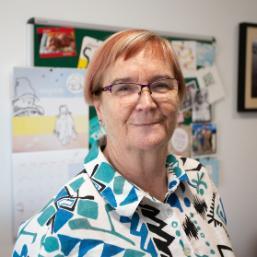Celebrating International Women's Day
Published: 24 May 2023
Inspiring us all - Marian Scott: Professor of Environmental Statistics
I am a professor in Mathematics and Statistics and recently celebrated 40 years as a member of staff here at Glasgow. When you count my time as an undergraduate and postgraduate both in Glasgow, then in fact, I will have been in the university for 50 years. That sounds really scary, 50 years, half a century, but it gives an interesting perspective on change and the rate of change in the discipline of Statistics, but also in the University.

The first thing to be said is that I didn’t know what Statistics was when I decided (randomly) to study a first-year Statistics course, but it certainly changed my life. Hence the degree in Statistics.
Then came the postgraduate stage, we hear a lot about ‘imposter syndrome’, am I smart enough or suited to undertake a PhD? That certainly played a big part in my agonising around the decision of PhD or job. Eventually, after much soul searching, I went for the PhD, which was joined with Chemistry and I loved it.
However, research is not all plain sailing. As I continue to remind (and encourage) my own students, we all go through periods where nothing seems to be working, and we question whether we made the right choice. But one lesson in life is that we need to be prepared with coping strategies to keep us going when things get tough. It is very easy to think “everyone else is always successful, but of course, that is not true.
After the PhD, what next- another decision point, industry, business, civil service or academia? Well again, after a lot of agonising, partly also about geography, did I want to stay in the west of Scotland, I decided to try academia. In Statistics at that time, it was quite usual to go straight to lectureship after PhD. So I started with a short fill-in for someone on study leave in Glasgow, and then I had to find a permanent job. This I did in Paisley (now University of West of Scotland) but I wanted to come back to somewhere that had a great Statistics tradition, so one year later, I applied for a post in Glasgow. I failed (I wasn’t the first choice for the post), but fortunately for me the 1st choice decided to choose something else, and the rest is history.
So what came next? An academic wears many hats, building up a research area, publishing, developing collaborations, applying for (and occasionally winning) grants, supervising students and teaching and administration. So much the same as today. Naturally, we think about climbing the promotion ladder, success is not guaranteed, so be prepared for not being successful at the first attempt.
The same story is true of grant applications, disappointment is often more common than success, but you try to take away positive messages to work on (hard but necessary). I still have successes and failures. I certainly don’t have a recipe for success, but I believe in what I am trying to do and that keeps me motivated to try.
What has changed in these 50 years? Less than you might think, more people will have heard about Statistics, but perhaps not always in the most positive way. More students are certainly studying Statistics, and there remains a strong employment base, although nowadays we often need to reinvent ourselves as data analysts or even data scientists. The relevance of good statistical skills, I think, is even more important. Data, data analytics, and data intelligence are becoming embedded in many more disciplines across the university.
Computation has changed beyond recognition (when I started we had hand calculators, and one university mainframe, with punch cards- now just think about the computational power we take for granted, ChatGPT and other such developments). But technology needs to work hand in hand with people. So my ultimate take-home message is that people trump technology, and it is people who make our work fulfilling.
First published: 24 May 2023
<< Spotlight

